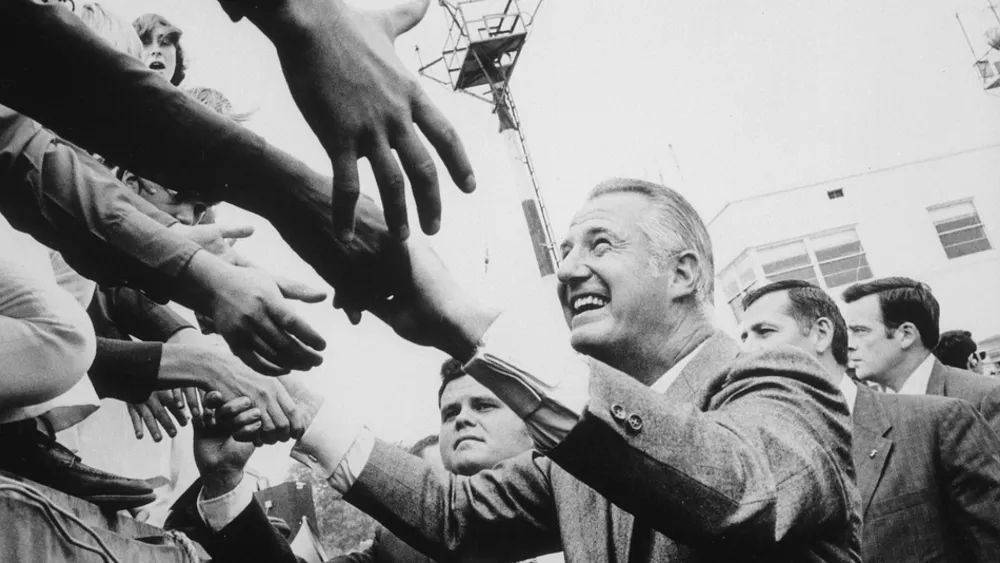Spiro Agnew, born November 9, 1918, served as the 39th Vice President of the United States from 1969 to 1973 under President Richard Nixon.
A Baltimore native and graduate of Johns Hopkins University, Agnew served in the U.S. Army during World War II and the Korean War.
After working in various roles, he became Baltimore County Executive in 1962 and Governor of Maryland in 1966.
Agnew, the first Greek-American governor, faced controversy in 1973, pleading no contest to tax evasion and resigning as Vice President.
Despite criticism, his combative stance endeared him to the conservative faction of the Republican Party.
Early Life and Military Service
Spiro Agnew’s roots in Baltimore, Maryland, intricately wove together the rich tapestry of his upbringing. Born on November 9, 1918, in this vibrant city, Agnew’s early life was steeped in the traditions of his Greek Orthodox heritage. The cultural influences of his family and environment deeply shaped his character, providing a strong foundation for the remarkable journey that lay ahead.
Moving through the corridors of education, Agnew attended Forest Park Senior High School, where he began to shape his intellectual identity. The high school years were pivotal, providing a robust academic foundation and nurturing the nascent qualities that would later define Agnew as a leader and public figure.
Spiro Agnew: From Academic Pursuits to the Battlefield
Upon graduation from Forest Park, Agnew’s pursuit of knowledge led him to the esteemed halls of Johns Hopkins University in 1937. There, he delved into the study of chemistry, dedicating three years to academic exploration. The university experience broadened his intellectual horizons. Moreover, it served as a crucible for the principles and values that would guide him in the years ahead.
In 1941, with the outbreak of World War II, Agnew’s life took an unexpected turn. He answered the call of duty and was drafted into the U.S. Army. His commitment to service was exemplified by his commissioning as an officer on May 25, 1942. Moreover, it followed the successful completion of Army Officer Candidate School. Assigned to the 10th Armored Division, Agnew played a pivotal role in the European theater, contributing to the Allied efforts in France and Germany.
Spiro Agnew: A Bronze Star Legacy from the Battlefield
The crucible of war forged Agnew’s character, and his military service was marked by distinction. His bravery and contributions in the face of adversity were recognized with the Bronze Star Medal. This accolade reflected Agnew’s courage and symbolized the collective sacrifices of those who served alongside him.
These early chapters of Agnew’s life lay the foundation for the multifaceted individual. From his upbringing in Baltimore to his academic pursuits and military service, he would go on to shape American politics in the years to come.
From Community Activism to Republican Advocacy
A significant ideological shift characterized Spiro Agnew’s journey through the political landscape as he transitioned from a Democrat to a staunch advocate of Republican principles. This transformation was not a mere change in affiliation. It also marked a profound evolution in Agnew’s political philosophy. Moreover, his initial steps into politics were rooted in community service. It is where he assumed roles in organizations such as the Loch Raven Community Council and the Dumbarton Junior High School PTA. These early engagements reflected his commitment to civic duty/ Moreover, they laid the groundwork for his burgeoning political career.
Breaking Democratic Strongholds
Agnew’s alliance with U.S. Congressman James Devereux during the 1950s was a crucial turning point, as he actively contributed to Devereux’s successful election bids.
The dynamics of this partnership provided Agnew with valuable insights into the intricacies of political maneuvering, shaping his political acumen.
Although faced with an electoral setback in 1960 during his bid for Judge of the Circuit Court, Agnew’s perseverance remains unshaken.
The true zenith of Agnew’s early political career materialized in 1962 when he emerged victorious in the race for Baltimore County Executive.
This triumph was a landmark achievement, breaking the stronghold of Democratic dominance in a region historically inclined towards the Democratic Party.
Agnew’s election signaled a personal triumph and positioned him for a trajectory that would ultimately propel him to the national stage. His journey from community activism laid the groundwork for local political appointments and elections. This path formed the crucible that molded Spiro Agnew into a formidable force in American politics.
Navigating Politics: Role as Vice President Under Nixon
Spiro Agnew’s time as Vice President under Richard Nixon from 1969 to 1973 was a significant period filled with political moves, strong policy support, and changing challenges.
In 1968, Nixon strategically chose Agnew as his running mate to appeal to voters in the South without becoming overly entangled in the region’s more controversial politics.
As Vice President, Agnew became a prominent figure, especially known for supporting the “silent majority” and advocating for law and order. During the Vietnam War and protests, Agnew stood firm against those who disagreed, often criticizing media coverage.
However, as time passed, his relationship with Nixon became more complicated. Nixon felt Agnew lacked the qualities needed for the presidency, leading to a gradual sidelining of Agnew in important decisions.
This strained their once-friendly partnership, revealing tensions amid the challenging political landscape of the era.

Legal Challenges, Strategic Choices, and Political Aftermath
The events surrounding the Resignation and Legal Issues in 1973 marked a significant turning point in Spiro Agnew’s political career.
Under investigation by the U.S. Attorney’s office in Maryland, Agnew faced charges of extortion, tax fraud, bribery, and conspiracy. It spanned his roles as Baltimore County Executive, Governor, and Vice President.
With these legal challenges, Agnew pleaded no contest to a single charge, acknowledging the failure to report $29,500 of income from 1967.
This strategic decision, however, came with the condition that Agnew resign from the office of Vice President.
Agnew’s resignation had broader implications on the political landscape. It made him the second Vice President in U.S. history to step down due to criminal charges.
Subsequently, President Richard Nixon appointed then-House Minority Leader Gerald Ford as Vice President. This move aimed at stabilizing the administration amidst the pressures of the Watergate scandal.
The Later Life of Spiro Agnew
After leaving the political scene, Spiro Agnew entered a new phase in Later Life and Legacy. He became an international trade executive and worked in various locations, including California and Maryland.
However, Agnew’s life after politics wasn’t free of controversies. In 1976, he made remarks that sparked criticism, particularly for comments about Jews and advocating against U.S. support for Israel.
These controversies added complexity to Agnew’s legacy. Some saw him as a strong political figure, while others remembered the challenges and criticisms he faced later. Agnew’s unexpected death in 1996 prompted reflections on his impact on American politics. Therefore, it left behind a legacy marked by achievements and controversies.











